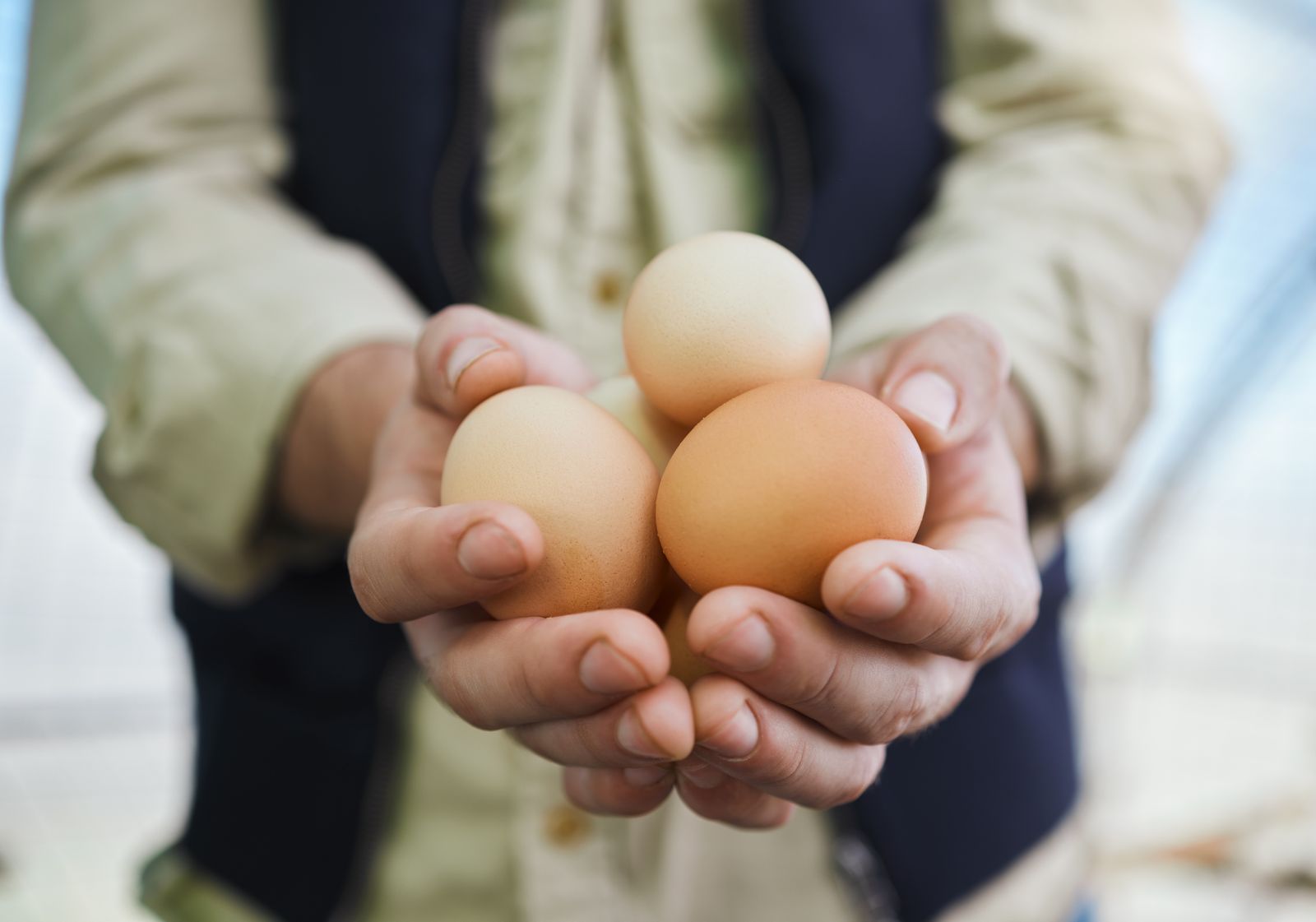If you keep chickens to produce eggs on your homestead or in your backyard, it is important to know how many eggs you can expect from your chickens each day. This will help you to plan your egg supply and choose the right chickens for the job.
Chickens do not lay eggs daily, but most egg-laying breeds lay between 4 and 6 eggs weekly. You can use these averages to calculate how many chickens you need to produce the desired number of eggs for your homesteading requirements. Selecting the right chicken breed for egg laying is important.
Factors such as age, breed, and health can impact a chicken’s egg-laying abilities. We will explore the question of how many eggs chickens lay in a day, along with other related aspects of raising chickens. With this information, you will better understand how to choose the right type of chicken for your needs and how to maximize egg production.
How Many Eggs Do Chickens Lay Daily?
Chickens do not typically lay eggs every day but every other day, allowing their bodies to recover from producing the eggs.
For this reason, egg production is usually rated by its annual or weekly laying rate. Some chicken breeds are better egg producers than others, and these are usually designated as egg-laying breeds rather than meat chickens.
The egg-laying figures I have indicated are averages, and you will find that some individuals in your flock may exceed this quantity, and some will fall short. Many homesteaders will keep a flock of at least 6 to 8 birds to cater to the egg-laying variation between individuals and still have sufficient egg production.
How Old Are Chickens When They Start Laying Eggs
Chickens are not born ready to lay eggs; rather, they undergo a maturation process before they can start laying. This process involves their reproductive system, which can take several months to develop and mature to the point of producing eggs.
The age at which chickens begin laying eggs varies depending on several factors, including their breed, diet, and environment. Generally, however, most chickens will begin laying eggs between the ages of 4-6 months.
It’s worth noting that while chickens may start laying eggs at this age, the number of eggs they produce will be relatively low at first. They will lay eggs more frequently as they mature and reach peak egg production.
Factors affecting the age at which chickens start laying eggs include the following.
- The chicken breed. Different breeds of chickens have different maturation rates. Some breeds, such as Leghorns, are known for starting to lay earlier than others.
- Diet. Chickens fed a well-balanced diet that includes enough protein, and other essential nutrients are likelier to start laying earlier.
- Light exposure. Exposure to light can trigger egg-laying in chickens. Ensuring chickens have access to adequate lighting or the right duration can help to stimulate their reproductive systems.
Understanding this timeline for when chickens begin laying eggs is important for chicken owners who want to plan for their egg production and ensure that their birds are healthy and well cared for.
What Are The Best Egg-Laying Chickens For Homesteading
When selecting the right chickens for egg production, there are many breeds to choose from. However, not all chicken breeds are created equal regarding egg-laying abilities.
Some breeds are known for high egg production rates, while others may produce fewer eggs or require special care.
I have listed some of the best egg-laying chicken breeds you can consider for your homestead.
- Leghorn. Leghorns are another breed that is prized for their egg-laying abilities. They are known for laying large white eggs and can produce up to 280 to 320 eggs annually. However, Leghorns can be a bit more flighty and skittish than other breeds. This breed produces an average of 5 to 6 eggs each week.
- Rhode Island Red. This breed is popular for backyard chicken keepers due to its hardiness and excellent egg production. Rhode Island Reds are known for producing large brown eggs and can lay up to 260 eggs per year. This amounts to almost 5 eggs each week per mature bird.
- Australorp. This breed is a good choice for homesteaders who want a chicken that is both a good egg layer and a good meat bird. Australorps are known for their calm temperament and can lay up to a maximum of 260 eggs per year, a weekly rate of 5 eggs per week.
- Ameraucana. Ameraucanas, also known as “Easter Eggers,” are known for their blue and green eggs. They can produce up to 250 eggs per year or 5 eggs per week and are a good choice for homesteaders who want a bit of variety in their egg baskets.
- Speckled Sussex. Sussex chickens are known for their sweet personalities and their excellent egg-laying abilities. They lay large brown eggs and can produce 200 to 250 eggs per year or 4 to 5 eggs per week.
- Plymouth Rock. Plymouth Rocks are a dual-purpose breed that is both good for meat and egg production. They lay large brown eggs and can produce up to 200 eggs per year or 4 eggs each week.
- Orpington. Orpingtons are popular with homesteaders due to their friendly personalities and excellent egg-laying abilities. They lay large brown eggs and can produce up to 200 eggs per year or 4 eggs a week.
- Hamburg. Hamburg chickens are a small and active breed that are good foragers. They lay small white eggs and can produce up to 180 to 200 eggs per year, which is up to 4 eggs per week per bird.
- Marans. Maran chickens are known for their dark brown eggs, a favorite among many homesteaders. They can produce up to 180-200 eggs per year, or up to 4 eggs per week, and are also a good choice for meat production.
It’s important to note that while these breeds are known for their egg-laying abilities, individual chickens within each breed may produce more or fewer eggs depending on factors like diet and environment. Weather and age can also impact a chicken’s egg production.
Selecting the right breed of chicken is an important consideration for homesteaders who want to maximize their egg production. By choosing one of these top egg-laying breeds, you can ensure that your flock will produce plenty of eggs for your needs.
Of course, there are many other chicken breeds out there that are good egg layers, so it’s important to do your initial research and choose a breed that fits your specific needs and preferences and is readily available in your region.
Do Meat Chickens Lay Eggs?
Meat chickens, also known as broilers, are typically raised for their meat rather than their egg-laying abilities. These chickens are bred to grow quickly and reach a large size, making them ideal for meat production.
Even though meat chickens are not specifically bred for egg production, they can still lay eggs. However, their egg-laying abilities are typically much lower than breeds specifically bred for egg production.
This means they will not produce as many eggs weekly or annually as chickens bred for their egg-laying characteristics.
Meat chickens are also often processed at a young age, usually between 6-8 weeks old. Consequently, they don’t have as much time to develop their egg-laying abilities as breeds kept for longer periods.
If you decide to keep meat chickens for egg production, it’s important to remember that they may not produce as many eggs as other breeds. They may also not be as hardy as other breeds, as they are not bred for longevity.
While meat chickens can lay eggs, they are not typically kept on the homestead for their egg-laying abilities. If you want to maximize your egg production, it’s best to choose a breed specifically bred for egg production, such as those I have already mentioned.
A dual-purpose chicken breed will be the best choice if you are looking for chickens for meat and eggs on the homestead. These chickens are good for meat and also have a good egg-laying rate.
Conclusion
The number of eggs chickens lay per day can vary widely depending on various factors, including their breed, age, and environment. Generally speaking, chickens will lay the most eggs during their first year of life, with egg production gradually decreasing as they age.
Chickens will generally not lay eggs every day, so their egg-laying rate is usually equated to the number of eggs per week or annually. Selecting a breed known for high-volume egg production is important if you want to maximize this option on your homestead.
References
https://khpet.com/blogs/farm/10-of-the-best-chicken-breeds-for-eggs
https://www.almanac.com/how-many-eggs-does-chicken-lay-each-day
https://www.allthingsnature.org/how-many-eggs-can-a-chicken-lay-in-one-day.htm


